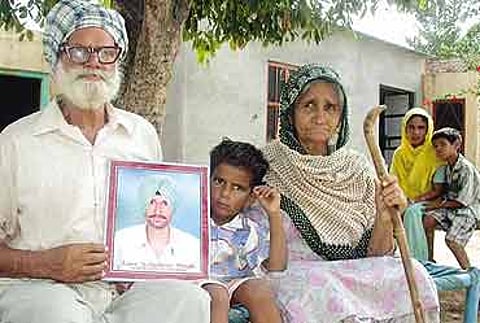One-Way Visa
An anxious countryside awaits its sons who went to Kuwait, but ended up in Iraq

'Watching Iraq' has now become the major obsession in the villages of Punjab. Dinar dreams have overnight turned into nervy nightmares, and promises of a better future a perilous web of lies. In the last six months, recruiting agents have hired hundreds here for driving trucks and sundry menial jobs in Kuwait, Jordan and the UAE. And though there are 30 licensed recruiting agents in Chandigarh, the subagents have built a chain of recruitment that percolates down to the village level, enabling fly-by-night operators to entice those who dream of working in a foreign country.
But the scales have now fallen off their eyes. And the villagers of Punjab now know the terrifying truth: their relatives who had obtained work permits and visas for Kuwait, the UAE and Jordan may have been lured to the killing fields of Iraq. With the kidnapping drama unfolding on TV, and the horrific tales of those Indians who have fled from Kuwait/ Iraq spreading like bushfire in the countryside, the villagers fear bad news could just be a stranger's visit away.
The case of Jasbir's death is typical. Employed with Ai Fajii Logistics in Kuwait, Jasbir was asked to drive an oil tanker into Iraq. In April-end, Jasbir's convoy was ambushed—a rocket slammed into his tanker, sending it careening into a berm. With Jasbir unable to extricate himself from the tanker, the frightened American armed escort set his vehicle on fire and fled. The company didn't even inform his father, Gurcharan, who came to know about the incident through Kuwait-based colleagues of his son. "I then contacted the company through the recruiting agent. In May, they sent some burnt pieces of flesh in a bag. They said these were my son's," sobs Gurcharan. He has neither received the salary of his son, nor has he been paid the insurance amount of 10,000 dinars the agents promise at the time of recruitment.
The stories of others, though luckier than Jasbir, are equally harrowing. Take the case of Anwar Khan, Fateh Singh and Vipin Kumar from the town of Anandpur Sahib. In April, they left for Kuwait to work for Al Hamadah Logistics International. On its arrival, the trio was ordered to drive trailers carrying ammunition and food supplies into Iraq. They refused. The enraged management confined them to a locked enclosure with bare amenities. The boys ultimately relented on the 26th day, hoping that a trip into Iraq could help enable them to recoup the money they had raised.
In Iraq, Anwar almost ended up as a resistance fighter's trophy. Driving in a convoy of 35 vehicles to the Talil military camp, 300 km southeast of Baghdad, Anwar came under fire—and was forced off the road. The standard operating procedure for all convoys in Iraq is that if a vehicle meets with an accident or is ambushed en route, it is blasted at the spot to prevent the Iraqis from looting it. Recalls Anwar, "Knowing this, I obediently veered into the side lane the fighters wanted me to move into. My convoy had already moved ahead. I was asked to stop at a point where there were 20 other plundered trucks". Anwar was kept in captivity for a day.On release, he hitchhiked to Kuwait.
Rattled by Anwar's experience, the trio decided to escape—they jumped the walls of the locked enclosure where they were kept in Kuwait. With the assistance of the Indian embassy, they reached Anandpur Sahib a fortnight ago. What is worrying, the trio says, is that hundreds of Indians are in Kuwait on a tourist visa. And they, like Anwar and his friends, would be sent to Iraq after they are made to sign a statement declaring they are going there at their own risk. Without a valid work permit, they can't hope for medical facilities or insurance, says Anwar.

You can become a nervous wreck driving on the highways of Iraq, says Harjit Singh of Hoshiarpur, who was ostensibly hired by kbr Operations for driving a Pepsi truck. But Harjit too was compelled to join an Iraq-bound convoy. "Accidents are common because you are required to drive for 20 hours at a stretch, at 120 km per hour on virtually non-existent roads. People throw stones at the windows, and bullets frequently whiz past." On his drive into Iraq, Harjit found hundreds of men, women and children begging passing convoys for food and water. "They would stone us if we did not give them water. And when we did, the American guards would hit us." One day, Harjit abandoned his truck on the highway and fled away.
Agents here estimate that in the last six months, more than 200 men have escaped from Iraq and returned to India. Yet, companies continue to recruit in India, thriving on the craze for dinars.
With more and more truckers reluctant to drive in Iraq, transport companies are reportedly resorting to strong-arm methods. Fateh Singh, who recently fled from Iraq, told Outlook, "If you refuse to go into Iraq after one trip there, they book you on false cases." Those who have escaped to India claim that scores of Indians are lodged in Kuwaiti jails for minor offences. "As their documents and passports are with the employers, they virtually become their captives," explains Fateh.
Recruits are susceptible to exploitation because they lack work permits and can't consequently claim legitimate benefits. The recruiting agents, obviously, justify the practice claiming employers often need fresh recruits in a hurry—and are reluctant to wait for the two months required to obtain work permits. "Once they work there for some time, the company usually arranges work permits for them," says Narendra Sharma, president of the Middle East Manpower Association. Not surprisingly, there is no compensation for those who die before they secure work permits.
The ongoing kidnapping saga has turned the heat on recruiting agents. Those responsible for sending the three kidnapped drivers have gone underground; others like Sharma have turned defiant. "Let's face it. These people are prepared to take risks to earn some extra money," says he. Even now agents continue to advertise in language dailies for driving 'trailers' in Kuwait. Familiar with the intrepid Punjabi's quest for fortunes in foreign lands, they know the kidnapping incident is a mere bend on the highway to Iraq.
Tags